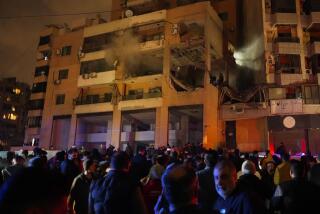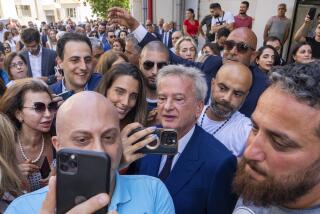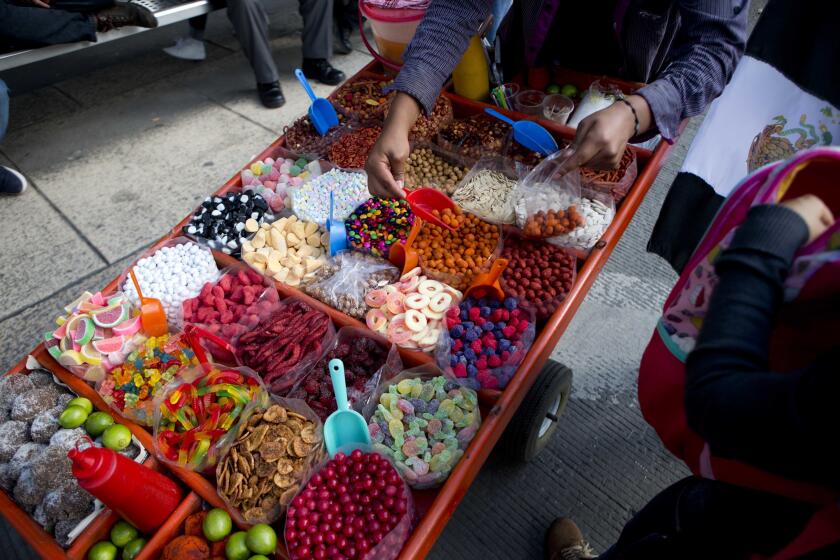Authorities in Lebanon Detain 5 in Hariri Slaying
BEIRUT — Five prominent, staunchly pro-Syria officials were detained, questioned and named as suspects Tuesday in the assassination of former Lebanese Prime Minister Rafik Hariri.
It was the first time investigators had publicly identified suspects in the massive Feb. 14 car bombing that killed 20 people, including Hariri, a popular, self-made billionaire who had grown increasingly opposed to Syria’s involvement in Lebanon. The men detained -- four former or current heads of Lebanese intelligence and security agencies and an ex-member of parliament -- were heavyweights in the Syrian-backed political and security network that ran Lebanon for decades.
Hariri’s slaying provoked a political upheaval, touching off a wave of anti-Syria protests and forcing the Syrian government in Damascus to pull its troops out of Lebanon this spring after 29 years. Lebanese authorities agreed to an international inquiry into the assassination after the United Nations questioned whether Beirut could impartially investigate it.
Syria has repeatedly denied involvement in Hariri’s death. But for the many Lebanese who believe that Syrian officials or their local allies plotted the assassination, the detentions seemed to augur a vindication.
“There is no doubt that the detentions are the first steps toward justice,” Saad Hariri, the son and political heir of the slain former prime minister, told Al Arabiya television from Paris. “This is the beginning.... God willing, the truth will emerge.”
Lebanese police moved through Beirut at daybreak to pick up Maj. Gen. Ali Hajj, the country’s former police chief; Maj. Gen. Jamil Sayyed, the former head of General Security; and Maj. Gen. Raymond Azar, the former military intelligence chief. Their houses were searched and they were held for questioning by U.N. investigators, who have permission to employ the police in raids, arrests and searches.
Two other suspects were not home when police arrived. Former parliament member Nasser Qandil drove back to Lebanon from Syria to face questioning.
“I want to hear what the investigators have to say and am prepared to respond to any question,” he said as he crossed the border at Masnaa. “I don’t want to enter a discussion now about the international probe, but God forbid it veers from its neutrality and provides a false truth.”
Meanwhile, Brig. Gen. Mustafa Hamdan, commander of the Republican Guard, turned himself in at the U.N. team’s headquarters.
Lebanese Prime Minister Fouad Siniora, a longtime aide to Rafik Hariri who now belongs to the younger Hariri’s political bloc, discussed the detentions with reporters at midday and stonily put to rest speculation that the men had been sought out simply as witnesses. “They are under investigation because they are suspects,” he said.
None of the men has been charged. Under Lebanese law, they can be held and questioned for several days without a lawyer.
Several analysts saw theatrical flourishes in the predawn raids and news conferences, and they said U.N. investigators were trying to send a message to Damascus: Nobody will be spared the rigors of the inquiry.
“They’re on the way to Damascus, so to speak,” said Jamil Mroue, publisher of Lebanon’s Daily Star newspaper. “If any one of them is implicated [in the death], it will be very difficult to dispel doubts that the Syrians were involved. If all of them were involved, then you’re saying the whole [Syrian] regime is involved.”
Syrian troops entered Lebanon in 1976, a year after civil war broke out. They stayed on as peacekeepers after the fighting ended in 1990, and slowly overtook virtually all aspects of politics, security and finance. Like most people who attained power in Lebanon after the war, Rafik Hariri cooperated closely with Syria for years. But by the time of his death, his relations with Damascus were badly frayed.
In the fall of 2004, Damascus was leaning on Lebanese lawmakers to change the constitution so that President Emile Lahoud, a Syria loyalist, could stay in office beyond his term limit.
Hariri objected to the idea of Lahoud, his rival, staying in power. Hariri met with Syrian President Bashar Assad and later told friends that Assad had threatened his life. In the end, a reluctant Hariri backed the extension of Lahoud’s term. Months later, he was killed.
Lebanon’s legislative elections this spring left parliament with an anti-Syria majority, led by Saad Hariri, for the first time since the war. But Lahoud is still president, much to the frustration of anti-Syria leaders.
The U.N. team, led by German prosecutor Detlev Mehlis, is due to finish its investigation in weeks and is to brief the U.N. Security Council on Thursday. Its work has been frustrated by Syrian intransigence, Mehlis told Syrian officials during a meeting in Geneva on Friday.
Damascus has yet to fulfill Mehlis’ July 19 request to present five people for interviews, U.N. Undersecretary-General for Political Affairs Ibrahim Gambari told the Security Council.
Assad and his aides have denied that their government has been evasive. “We’ll continue cooperating, and full cooperation was pledged by the highest leadership in Syria,” Fayssal Mekdad, Syria’s ambassador to the U.N., said Tuesday.
Anne Patterson, the deputy U.S. ambassador to the U.N., called Tuesday’s events “a very dramatic development.”
“These gentlemen who have been arrested do ... reportedly have long-standing ties with Syria,” she said.
In the wake of Hariri’s death, Lebanon has been rattled by bombings, assassinations and political upheaval, and many Lebanese fear that the investigation may stoke more violence.
Mindful that several opponents of Syria have been killed in Lebanon in recent months, many well-known anti-Syria figures are keeping a low profile, wreathing themselves in thick security or slipping out of the country. On Tuesday, Saad Hariri acknowledged that he had been staying in Paris recently, “partly because of security concerns.”
Druze leader Walid Jumblatt, too, was in Paris on Tuesday. Newspaper publisher Gibran Tueni, a harsh critic of Syria who is also in the French capital, has said that he has been warned his name is on a hit list.
Against this backdrop of uncertainty, excitement mingled with anxiety in the muggy streets of Beirut on Tuesday.
“It’s about time,” said Salem Hawi, 27, a clerk in a boutique. “It’s like an open secret that we all knew but we were waiting for the rest of the world to figure out. We’ve always known that these Syrian agents had something to do with Hariri’s death.”
But his aunt, 62-year-old Souad Hawi, urged caution.
“When you cut off a snake’s head, the body writhes,” she said. “I don’t think we have seen the end of political assassinations and violence. Things just aren’t that easy in Lebanon.”
Times staff writer Maggie Farley at the United Nations contributed to this report.
More to Read
Sign up for Essential California
The most important California stories and recommendations in your inbox every morning.
You may occasionally receive promotional content from the Los Angeles Times.










